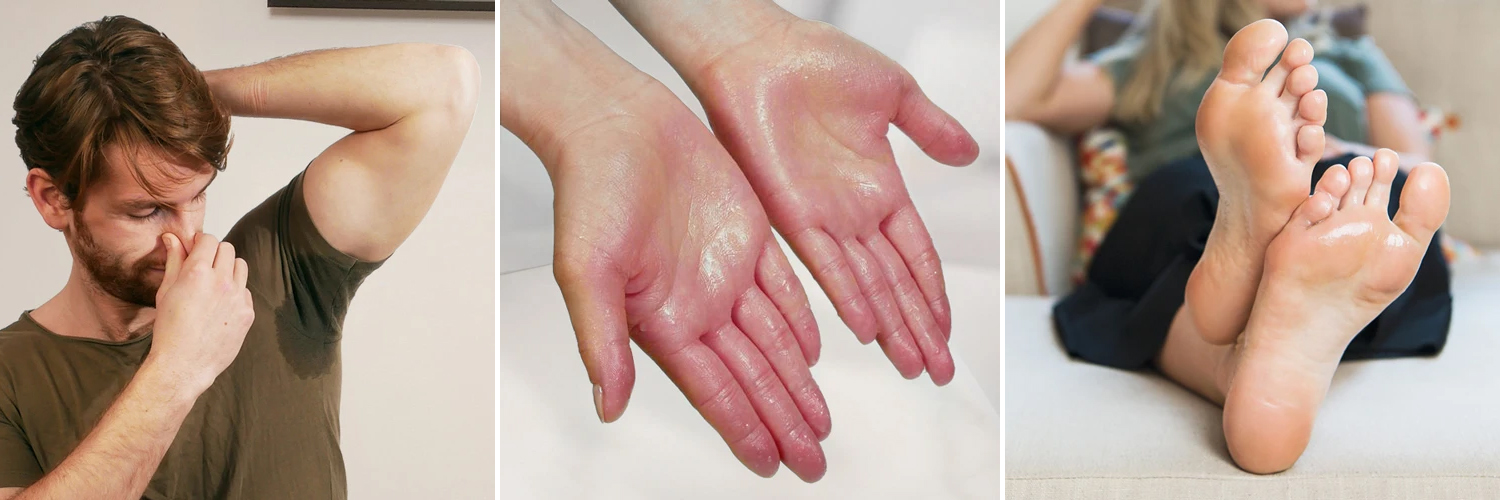Comprehensive Overview to Sweaty Hands Treatment: Proven Dermatology Techniques
Comprehensive Overview to Sweaty Hands Treatment: Proven Dermatology Techniques
Blog Article
Comprehending the Source of Excessive Sweating and Its Impact on Daily Life
Excessive sweating, also referred to as hyperhidrosis, is a problem that affects a substantial part of the populace, yet its hidden reasons and effects on everyday functioning remain somewhat enigmatic. While it is frequently comprehended as a physical response to regulate body temperature level, the triggers for extreme sweating can differ extensively among people, incorporating not only physical variables but also psychological and emotional components. Furthermore, the influence of this problem expands beyond simple discomfort, commonly affecting social interactions and total lifestyle. By delving right into the origin of hyperhidrosis and discovering its multifaceted impacts, a much deeper understanding of this pervasive concern can be gotten, clarifying the intricacies that people grappling with excessive sweating browse every day.
Physiology of Sweat Glands
The policy of sweat production, an essential physical procedure, is primarily regulated by the activity of sweat glands dispersed throughout the human body. Sweat glands are classified into two primary kinds: eccrine and apocrine glands. Eccrine glands are the most various and are located in almost all locations of the body. They play a crucial role in thermoregulation by producing a watery fluid onto the skin's surface area, which evaporates and aids cool down the body down. In contrast, apocrine glands are concentrated in areas rich in hair follicles, such as the underarms and groin, and their secretions are thicker and milklike in appearance.
When the body temperature climbs, either due to physical task, heats, or emotional stress, the nerves activates the sweat glands to produce sweat. This sweat is made up mostly of water and electrolytes like sodium and chloride. The procedure of sweat production is essential for keeping the body's internal temperature level within a slim, ideal array, highlighting the important role sweat glands play in human physiology.
Triggers for Excessive Sweating
In recognizing the origin of too much sweating, it is essential to recognize the triggers that can cause this physical feedback. Excessive sweating, likewise referred to as hyperhidrosis, can be motivated by various elements, both physical and environmental. One common trigger is psychological anxiety or anxiousness, which can stimulate the body's sweat glands to create even more sweat than is necessary for cooling down. Physical exertion, high temperature levels, and spicy foods are likewise understood to set off too much sweating in individuals susceptible to this condition. Certain clinical problems like menopause, diabetes mellitus, or hyperthyroidism can contribute to excessive sweating as well.
Moreover, medicines such as some antidepressants, opioids, and particular supplements can likewise work as triggers for hyperhidrosis. Recognizing these triggers is crucial in taking care of too much sweating effectively - Treatment for hyperhydrosis of hands. By recognizing and resolving the particular triggers that motivate extreme sweating in an individual, doctor can create customized treatment plans to reduce this condition and boost the individual's lifestyle
Medical Issue Associated
Associated with excessive sweating are various clinical conditions that can aggravate this physical reaction. One common problem is hyperhidrosis, a disorder characterized by unusually increased sweating that exceeds the body's thermoregulatory demands. This can show up in focal locations like the palms, soles, underarms, or face, impacting a person's quality of life as a result of social humiliation and discomfort.
In addition, endocrine problems such as hyperthyroidism, diabetes mellitus, and menopausal hot flashes can also bring about excessive sweating. Hyperthyroidism causes an overproduction of thyroid hormones, increasing metabolic process and activating sweating. Diabetes mellitus can generate sweating episodes, particularly throughout hypoglycemic episodes when blood sugar level degrees go down too reduced. Menopausal warm flashes, credited to hormone fluctuations throughout menopause, can cause extreme and sudden sweating, usually come with by flushing and heart palpitations.
Furthermore, infections like tuberculosis, endocarditis, and hiv have actually been associated with evening sweats, a typical signs and symptom known to interrupt sleep and influence total health. These medical problems highlight the varied series of underlying elements that can add to extreme sweating, necessitating comprehensive examination and monitoring by healthcare professionals.
Emotional and psychological Factors

Effect on Social Interactions
Excessive sweating can have extensive effects on a person's ability to engage easily in social communications. The noticeable signs of sweat stains or damp spots on clothes can result in shame and self-consciousness, triggering individuals to take out from social situations. This withdrawal can affect connections, limit social activities, and hinder professional and individual growth.

Additionally, the anxiety and self-esteem problems coming from excessive sweating can impact communication and interpersonal view website abilities. People might have a hard time to concentrate on conversations, join team activities, or reveal themselves confidently. This can lead to sensations of seclusion and isolation, as social links become testing to preserve.
Final Thought

While it is generally understood as a physical reaction to control body temperature, the triggers for too much sweating can vary extensively among individuals, encompassing not only physical elements yet psychological and likewise psychological components. By delving right into the origin creates of hyperhidrosis and exploring its multifaceted impacts, a deeper understanding of this pervasive problem can be obtained, dropping light on the complexities that people grappling with too much sweating browse on a daily basis.
Physical exertion, high temperatures, and spicy foods are also known to cause excessive sweating in people prone to this problem. By determining and attending to the certain triggers that trigger excessive sweating in an her response individual, medical care carriers can create tailored therapy strategies to minimize this condition and boost the individual's quality of life.
Too much sweating can have extensive effects on an individual's capability to engage easily in social interactions.
Report this page